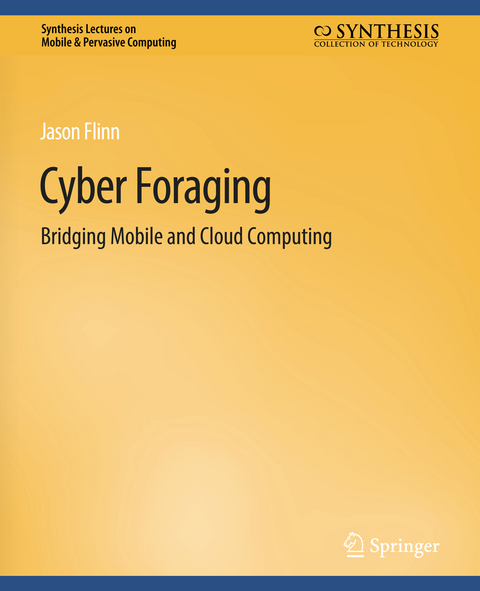
Cyber Foraging
Bridging Mobile and Cloud Computing
Seiten
2011
Springer International Publishing (Verlag)
978-3-031-01353-9 (ISBN)
Springer International Publishing (Verlag)
978-3-031-01353-9 (ISBN)
This lecture provides an introduction to cyber foraging, a topic that lies at the intersection of mobile and cloud computing. Cyber foraging dynamically augments the computing resources of mobile computers by opportunistically exploiting fixed computing infrastructure in the surrounding environment. In a cyber foraging system, applications functionality is dynamically partitioned between the mobile computer and infrastructure servers that store data and execute computation on behalf of mobile users. The location of application functionality changes in response to user mobility, platform characteristics, and variation in resources such as network bandwidth and CPU load. Cyber foraging also introduces a new, surrogate computing tier that lies between mobile users and cloud data centers. Surrogates are wired, infrastructure servers that offer much greater computing resources than those offered by small, battery-powered mobile devices. Surrogates are geographically distributed to be as close as possible to mobile computers so that they can provide substantially better response time to network requests than that provided by servers in cloud data centers. For instance, surrogates may be co-located with wireless hotspots in coffee shops, airport lounges, and other public locations. This lecture first describes how cyber foraging systems dynamically partition data and computation. It shows how dynamic partitioning can often yield better performance, energy efficiency, and application quality than static thin-client or thick-client approaches for dividing functionality between cloud and mobile computers. The lecture then describes the design of the surrogate computing tier. It shows how strong isolation can enable third-party computers to host computation and store data on behalf of nearby mobile devices. It then describes how surrogates can provide reasonable security and privacy guarantees to the mobile computers that use them. The lecture concludes with a discussion of data staging, in which surrogates temporarily store data in transit between cloud servers and mobile computers in order to improve transfer bandwidth and energy efficiency. Table of Contents: Introduction / Partitioning / Management / Security and Privacy / Data Staging / Challenges and Opportunities
Jason Flinn is an Associate Professor of Computer Science and Engineering at the University of Michigan, Ann Arbor. He received his Ph.D. from Carnegie Mellon University in 2001. He has served as technical program committee co-chair of the International Conference on Mobile Systems, Applications, and Services (MobiSys) and the USENIX Conference on File and Storage Technologies (FAST). He received an NSF Career award and best paper awards from numerous conferences. His research interests include mobile computing, operating systems, storage, and distributed systems.
Introduction.- Partitioning.- Management.- Security and Privacy.- Data Staging.- Challenges and Opportunities.
| Erscheinungsdatum | 06.06.2022 |
|---|---|
| Reihe/Serie | Synthesis Lectures on Mobile & Pervasive Computing |
| Zusatzinfo | X, 93 p. |
| Verlagsort | Cham |
| Sprache | englisch |
| Original-Titel | Cyber Foraging |
| Maße | 191 x 235 mm |
| Gewicht | 212 g |
| Themenwelt | Informatik ► Software Entwicklung ► Mobile- / App-Entwicklung |
| Mathematik / Informatik ► Mathematik | |
| Technik | |
| ISBN-10 | 3-031-01353-0 / 3031013530 |
| ISBN-13 | 978-3-031-01353-9 / 9783031013539 |
| Zustand | Neuware |
| Informationen gemäß Produktsicherheitsverordnung (GPSR) | |
| Haben Sie eine Frage zum Produkt? |
Mehr entdecken
aus dem Bereich
aus dem Bereich
Das große Handbuch zum JavaScript-Framework
Buch | Hardcover (2022)
Rheinwerk (Verlag)
CHF 55,85
Eine umfassende Einführung
Buch | Softcover (2021)
De Gruyter Oldenbourg (Verlag)
CHF 62,90


